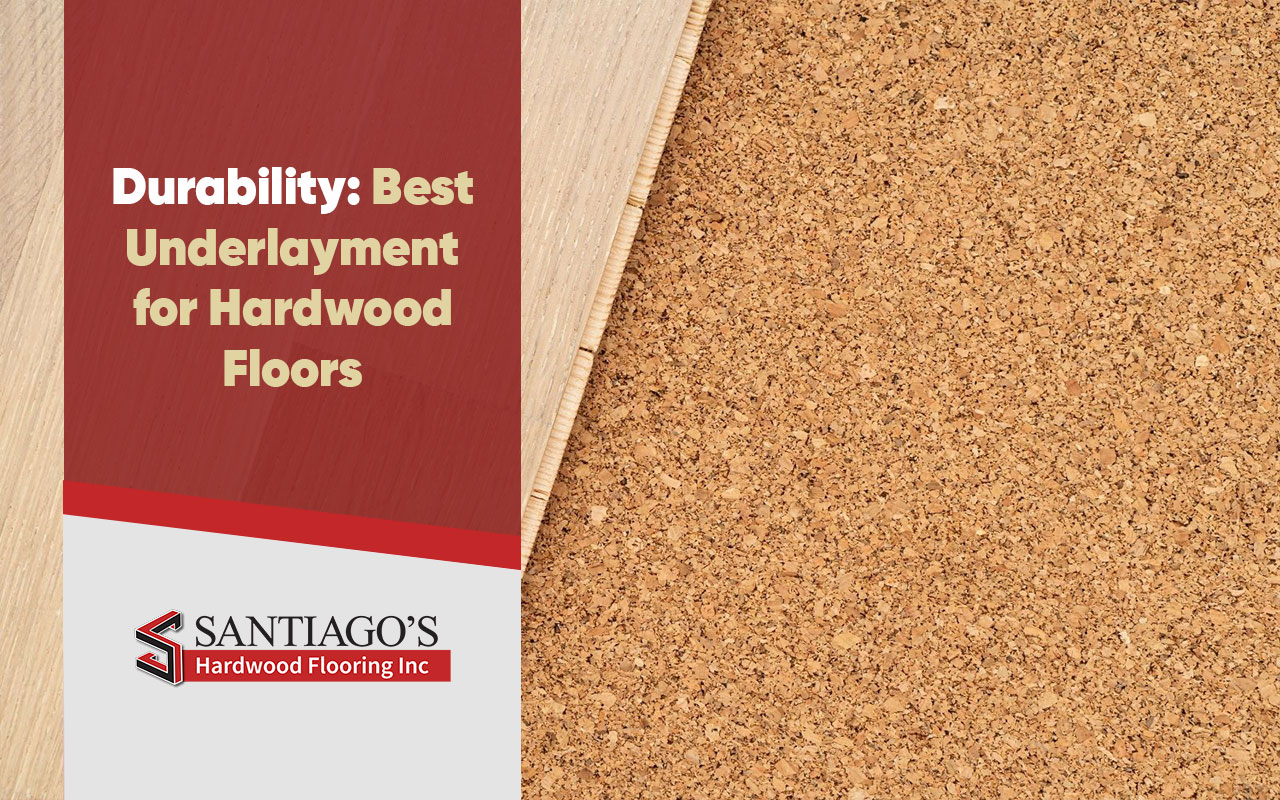
Choosing the best underlayment for hardwood floors isn’t just about what’s available at the store. It’s about comfort, durability, noise control, and moisture protection. If you’re installing hardwood in your home or updating old flooring, the underlayment you pick plays a big role in how your floor looks, feels, and sounds over time.
At Santiago’s Hardwood Flooring Inc, we help homeowners find flooring solutions that fit their home and lifestyle. Whether you’re working on a full renovation or a simple upgrade, here’s what to know when picking the right underlayment.
Understanding the Best Underlayment for Hardwood Floors
What Is Underlayment and Why Does It Matter?
Underlayment is the layer of material that goes between your subfloor and the hardwood surface. It cushions foot traffic, supports the planks, and helps with sound and moisture control.
While some hardwood products come with pre-attached padding, most professional installers recommend a separate underlayment for better performance and long-term benefits.
Key Benefits of a High-Quality Underlayment
- Cushioning and support for daily foot traffic
- Smooths minor subfloor imperfections
- Improves thermal insulation
- Reduces noise transmission
- Acts as a moisture barrier when needed
For homeowners, this means more comfort underfoot and fewer long-term issues like buckling, creaking, or mold growth.
Prioritizing Hardwood Floor Noise Insulation
Why Sound Matters
If you’ve ever heard footsteps echo across a floor, you’ve experienced poor insulation. Good underlayment can prevent that. Many customers choose underlayments specifically designed for hardwood floor noise insulation to make their living spaces quieter and more comfortable.
Top Underlayment Materials for Sound Control
When it comes to reducing noise, several underlayment materials stand out. Foam with sound barriers is lightweight and effective, making it a popular choice for general use. Rubber underlayments are ideal for apartments or second floors due to their excellent sound-dampening properties. For an eco-friendly option, cork padding naturally absorbs sound while also offering sustainability benefits.
Choosing the right sound-reducing layer ensures peace and quiet, especially in multi-story homes or rooms with high ceilings.
The Role of Moisture Barrier Underlayment for Laminate Flooring
Is Moisture a Concern for Hardwood?
Absolutely. Even engineered hardwood can suffer from moisture exposure. That’s why a moisture barrier underlayment for laminate flooring is also used in many hardwood installations—especially in basements or over concrete.
Best Options for Moisture Protection
- Polyethylene film – a basic but effective barrier
- Combination foam with vapor barriers – two-in-one solution
- Rubber underlayment with sealed seams – perfect for humid climates
If you’re installing over concrete or in areas like kitchens or basements, moisture protection is essential to prevent warping, mildew, and damage.
How to Choose the Right Underlayment for Your Home
Factors to Consider
Not every home requires the same type of underlayment, so it’s important to consider your specific needs.
Start by identifying whether your subfloor is made of wood or concrete, as this can affect moisture risk and compatibility. Think about whether you need sound insulation, especially for multi-level homes. Moisture protection is essential in areas like basements or kitchens. And if sustainability matters to you, eco-friendly materials like cork may be a great fit. Taking all these factors into account helps ensure your hardwood floor looks great and lasts for years.
A tailored approach ensures your hardwood flooring performs better and lasts longer.
At Santiago’s Hardwood Flooring Inc, we guide our clients through every decision. From product selection to professional installation, we make sure you get floors that feel as good as they look.
FAQs – Best Underlayment for Hardwood Floors
What is the best underlayment for hardwood floors on concrete?
We recommend underlayments with built-in moisture barriers such as rubber or foam with vapor protection to prevent moisture damage over time.
Does underlayment help with hardwood floor noise insulation?
Yes. High-quality underlayment can reduce footstep sounds, squeaks, and echoing. Cork, rubber, and specialized foam are great for noise reduction.
Can I use moisture barrier underlayment for laminate under hardwood?
In many cases, yes. Moisture barriers designed for laminate also work well under hardwood, especially over concrete or in humid rooms.
Ready to Upgrade Your Hardwood Floors?
Choosing the best underlayment for hardwood floors makes a difference in every step. If you want floors that are quieter, more comfortable, and longer-lasting—Santiago’s Hardwood Flooring Inc is here to help.
Let us recommend the perfect underlayment for your home and handle your hardwood flooring installation from start to finish.
Contact us today to get started with a free consultation.
